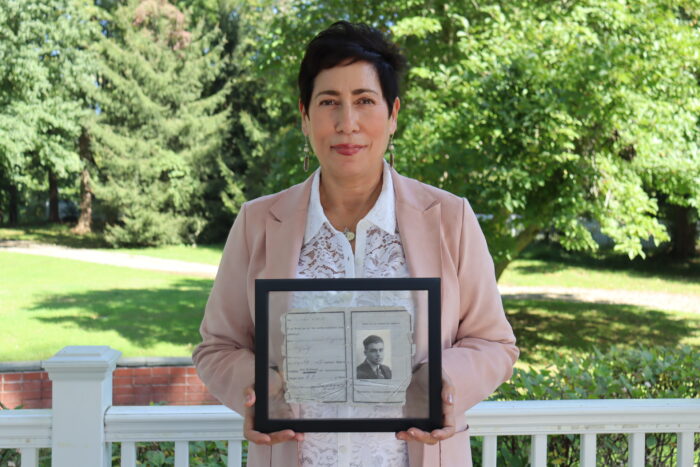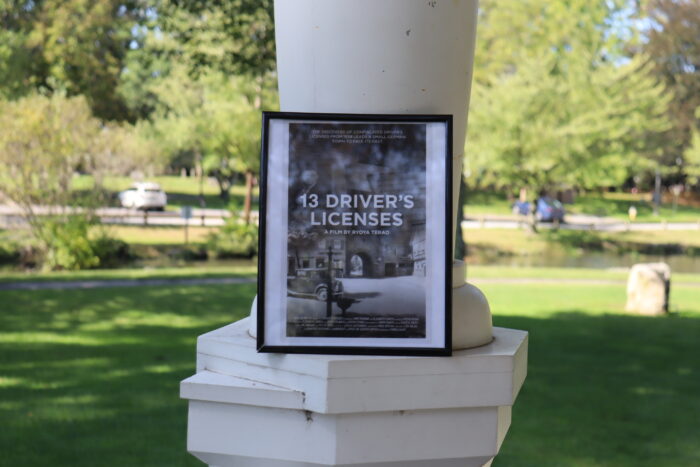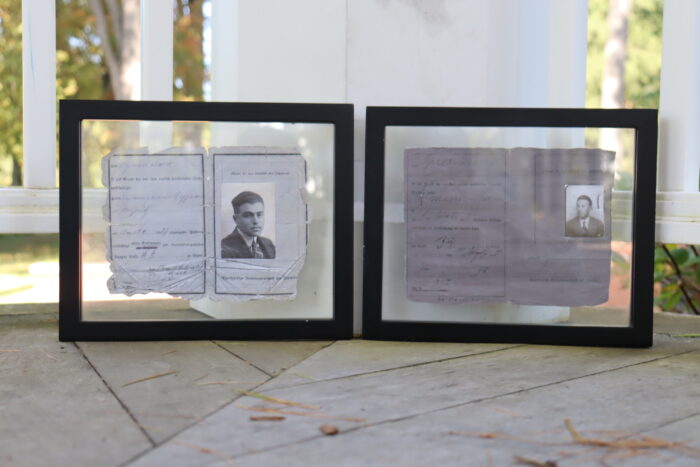
Salko’s Talk Took Place on the 85th Anniversary of Kristallnacht
When she was growing up, former Armonk resident Lisa Salko knew very little about her family’s past during the Holocaust. But all that changed with a Facebook message from a German high school student named Victoria Thiel who was working on a history project.
In 2017, a small village in Germany’s Bavaria called Lichtenfels had found 13 licenses in a brown envelope in a back-room cupboard in the district office while digitizing town records. The licenses were confiscated from Jewish residents during Kristallnacht also known as the “Night of Broken Glass” in 1938 in which Nazis arrested 30,000 Jews, destroyed Jewish-owned businesses, homes and synagogues and murdered 91 Jews and injured hundreds, marking the beginning of the Holocaust.
The licenses had been there for almost 80 years. Instead of digitizing the licenses and archiving them in Bamberg as required by law because they are historical documents, the district administrator, Christian Meissner instead got in touch with history teacher Manfred Brösamle-Lambrecht who taught at the local high school.
Brösamle-Lambrecht, who is not Jewish, cared deeply about the fate of these former Jewish residents and thought it could serve as a teachable moment for his students in his History Seminar class to research what had happened to these 13 individuals, and also try to locate their descendants. And so, his students at Meranier-Gymnasium Lichtenfels embarked on a yearlong project that changed all their lives.
Salko’s grandfather, Sigmund Marx and two great uncles, Alfred Marx and Alfred Oppenheimer drivers’ licenses were among three of the 13 confiscated licenses. Salko and her two sisters happened to all be together at Lisa’s nephews’ wedding in Florida when Thiel first reached out. After months of communication back and forth, they were invited to Lichtenfels for a week to learn about the project. The trip coincided with the 80th anniversary of Kristallnacht. “We went and it was extraordinary. We thought we would just hear the student’s presentation in a classroom, but it was a big deal. It was in the school’s auditorium and the entire community and press was invited to attend. The licenses were returned to us by the district administrator. “It was a life changing moment for my sisters and I.” Lisa and her sisters spent their time in Lichtenfels learning about their family history all while getting to know the students, their teacher and all the people involved in the project. Friendships were formed that continue to this day.
“It was an incredibly overwhelming and emotional week but also enlightening for my sisters and I.
On the eve of our departure, I made a promise to the German students and their teacher and said I don’t know how I am going to do this, but I am going to get this story out there and that’s what I pursued upon my return,” said Salko.

A Promise Turns into an Award-Winning Documentary
Salko got in touch with the White Plains-based Holocaust & Human Rights and Education Center (HHREC) and they put together a panel exhibit that was a replica of what the students in Lichtenfels had created. Since 2018, as a member of the HHREC’s speaker’s bureau, this journey has taken Salko to numerous synagogues, libraries, schools, Baruch College, The Museum of Jewish Heritage, the German Consulate in NY and most recently at Yad Vashem – The World Holocaust Remembrance Center in Jerusalem, Israel.
“We’re very happy that Yad Vashem showcased the exhibit and talk, accompanied
by our Director of Education Steve Goldberg. Lisa Salko is a strong speaker who tells the story with passion and vigor and so 13 Drivers’ Licenses has become one of the Holocaust & Human Rights Education Center’s most popular exhibits,” said Millie Jasper, the Executive Director of the HHREC.
In 2020, Brösamle-Lambrecht wrote a letter to the German Consulate in New York telling them about the project and Salko’s lecture and panel exhibit which would be presented at the Museum of Jewish Heritage in NYC. The Consulate co-sponsored Lisa’s event at the museum. They were so impressed by it that they asked Salko if she’d be willing to help create video content about the project for the consulate website. Although Salko is not a filmmaker, she was committed to getting this project off the ground. “After numerous zoom meetings with the Consulate, we thought it would be a short video, maybe a few minutes long,” recalls Salko. Salko’s determination along with her ability to maintain and pursue connections were crucial to helping to turn the story into an award-winning short documentary.
In 2019, Salko presented at Westchester Reform Temple in Scarsdale and an audience member, Elisabeth Gareis introduced herself. Gareis, who is not Jewish, grew up in Lichtenfels and is a professor of Intercultural Communications Studies at Baruch College. “She was fascinated by the story. I call her my groupie as she has seen me present so many times,” jokes Salko. At her presentation at Manhattanville College, Gareis introduced Salko to her husband, Ryoya Terao, a film technology professor at the New York City College of Technology.
Salko asked Tarrytown-based Terao if he’d be interested in working on the video content on behalf of the German Consulate. The story immediately appealed to him. “We wanted to tell a different kind of story from other Holocaust-related films – something that is hopeful for the future,” said Terao. Then the pandemic hit. As fate has it, Gareis and Terao were quarantining in Lichtenfels to stay with Gareis’ elderly mother who still lived there. With the help of Brösamle-Lambrecht, they were able to track down the students who were now in university and began filming them. Salko served as a consultant on the film.
Tarrytown-based Terao had never filmed a documentary about the Holocaust, but he has created many short films focused on human rights. At press time, the 27-minute long short documentary, 13 Drivers Licenses, has appeared in 37 film festivals in 17 countries (including the U.S.) and has won 28 awards. It was just selected to be a part of the United Nations Association Film Festival (UNAAF) in late October in San Francisco. Terao is working on a longer feature length documentary with many of the Holocaust survivors and their descendants who were interviewed.

Screening in Armonk
The short documentary 13 Drivers’ Licenses was also viewed while we were in press on November 9th at the North Castle Public Library’s Whippoorwill Hall. “Since it was in Armonk where I raised my family, I viewed this as a homecoming in a way,” explains Salko. It also coincided with the 85th anniversary of Kristallnacht and the fifth anniversary of when Salko first traveled to Lichtenfels.
“You can’t hold today’s generation responsible for what their ancestors did,” said Salko. “I talk about reconciliation a lot – meeting these students and what they did for our family was a gift. They helped fill in our family’s puzzle.”
Prior to her trip, Salko did not consider herself an activist. But she believes the Unite the Right rally in Charlottesville, VA in 2017 and the Tree of Life Synagogue shooting in Pittsburgh 10 days before her trip to Germany propelled her to speak out against antisemitism. These events coupled with the fact that there is no nationwide mandate for Holocaust education were catalysts for her dedicating herself to Holocaust education.
“I will tell this story to whoever will listen to me. We live in a world where words of hatred have become commonplace and accepted. It was words of hatred that ignited the Holocaust. As we get further removed from it, as the survivor community continues to diminish in numbers and antisemitism, Holocaust denial and distortion is on the rise, we must stand up, speak out, and most importantly tell survivor stories so this never happens again.”
“This high school project from a small Bavarian town in Germany is now used by educators as a teaching tool worldwide,” she says proudly, thanks to her presentation at Yad Vashem and her unwavering commitment to sharing the 13 Driver’s Licenses story.
